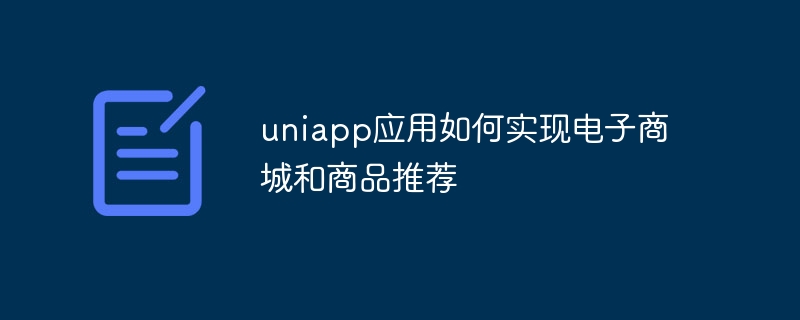

How uniapp application implements e-mall and product recommendation
With the development of the Internet, e-commerce has become one of the most popular shopping methods today. In order to provide users with a better shopping experience, the development of e-mall applications has become increasingly important. Product recommendation is to increase users’ purchasing rate and increase sales. This article will introduce how to use uniapp to develop an e-mall application and provide some code examples.
1. Implementation of electronic mall
Taking the product list page as an example, you can create a GoodsList component to display the product list. The code example is as follows:
<template>
<view>
<view v-for="(item, index) in goodsList" :key="index">
<image :src="item.image"></image>
<text>{{ item.title }}</text>
<text>{{ item.price }}</text>
</view>
</view>
</template>
<script>
export default {
data() {
return {
goodsList: [
{
image: 'goods1.jpg',
title: '商品1',
price: 100
},
{
image: 'goods2.jpg',
title: '商品2',
price: 200
},
// 其他商品数据
]
}
}
}
</script>In actual e-mall applications, product data is usually obtained through interfaces. You can use the uni.request method to send a request and assign the data to goodsList after the request is successful. The code example is as follows:
<script>
export default {
data() {
return {
goodsList: []
}
},
created() {
this.getGoodsList()
},
methods: {
getGoodsList() {
uni.request({
url: 'https://example.com/api/goods',
success: (res) => {
this.goodsList = res.data
}
})
}
}
}
</script>2. Implementation of product recommendation
Product recommendation is a personalized recommendation result obtained by analyzing the user's purchase history, browsing history, etc. In order to implement the product recommendation function, we can use the storage API provided by uniapp to store and obtain user information.
When the user logs in or registers successfully, the user information can be stored locally to facilitate subsequent recommendation calculations. The code example is as follows:
uni.setStorageSync('userInfo', userInfo)On the page where product recommendation is required, you can request the recommendation interface to obtain the recommendation results based on the user's information. The code example is as follows:
<script>
export default {
data() {
return {
recommendList: []
}
},
created() {
this.getRecommendList()
},
methods: {
getRecommendList() {
const userInfo = uni.getStorageSync('userInfo')
uni.request({
url: 'https://example.com/api/recommend',
data: {
userId: userInfo.userId
},
success: (res) => {
this.recommendList = res.data
}
})
}
}
}
</script>The above is the specific method and sample code of how the uniapp application implements e-mall and product recommendation. Through reasonable page structure and data requests, e-mall applications can provide a good shopping experience. By analyzing user information to recommend products, users’ purchase rates and sales can be increased. Hope this article is helpful to you!
The above is the detailed content of How uniapp application implements e-mall and product recommendation. For more information, please follow other related articles on the PHP Chinese website!
 The difference between flutter and uniapp
The difference between flutter and uniapp
 Flutter framework advantages and disadvantages
Flutter framework advantages and disadvantages
 What is the difference between full-width spaces and half-width spaces?
What is the difference between full-width spaces and half-width spaces?
 What is short selling?
What is short selling?
 How to set up the router
How to set up the router
 How to find the sum of even items in an array in php
How to find the sum of even items in an array in php
 Computer software systems include
Computer software systems include
 Digital camera driver
Digital camera driver




